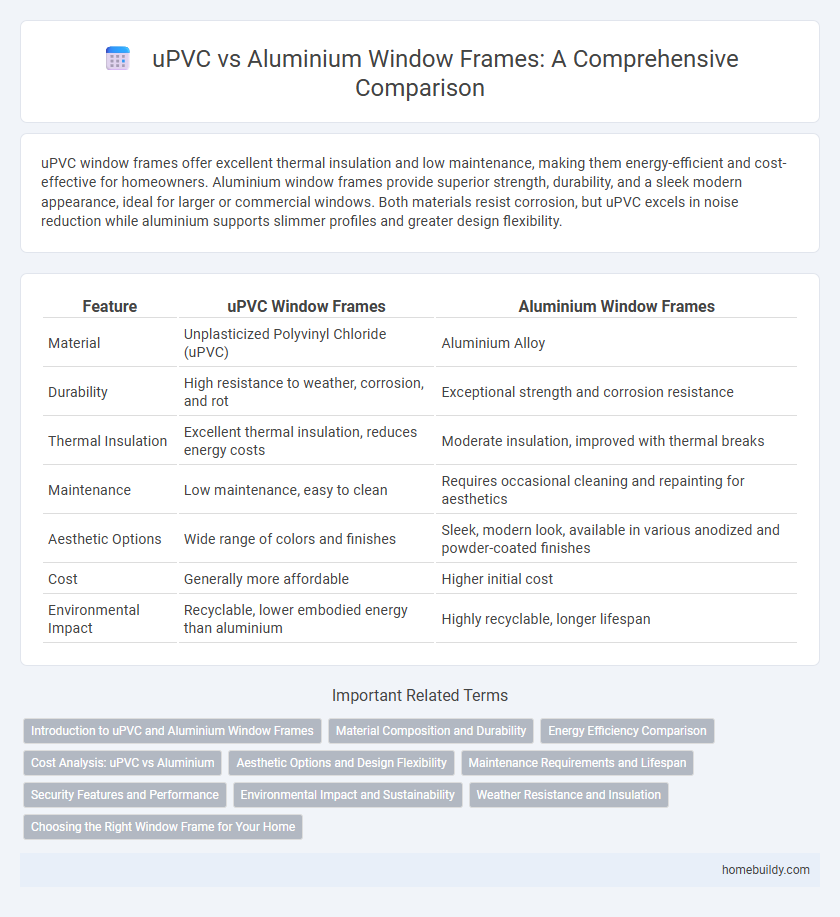uPVC window frames offer excellent thermal insulation and low maintenance, making them energy-efficient and cost-effective for homeowners. Aluminium window frames provide superior strength, durability, and a sleek modern appearance, ideal for larger or commercial windows. Both materials resist corrosion, but uPVC excels in noise reduction while aluminium supports slimmer profiles and greater design flexibility.
Table of Comparison
| Feature | uPVC Window Frames | Aluminium Window Frames |
|---|---|---|
| Material | Unplasticized Polyvinyl Chloride (uPVC) | Aluminium Alloy |
| Durability | High resistance to weather, corrosion, and rot | Exceptional strength and corrosion resistance |
| Thermal Insulation | Excellent thermal insulation, reduces energy costs | Moderate insulation, improved with thermal breaks |
| Maintenance | Low maintenance, easy to clean | Requires occasional cleaning and repainting for aesthetics |
| Aesthetic Options | Wide range of colors and finishes | Sleek, modern look, available in various anodized and powder-coated finishes |
| Cost | Generally more affordable | Higher initial cost |
| Environmental Impact | Recyclable, lower embodied energy than aluminium | Highly recyclable, longer lifespan |
Introduction to uPVC and Aluminium Window Frames
uPVC window frames are crafted from unplasticized polyvinyl chloride, offering excellent thermal insulation and low maintenance, making them energy-efficient choices for modern homes. Aluminium window frames provide superior strength and durability, with a sleek, contemporary look that withstands harsh weather conditions and requires minimal upkeep. Both materials serve distinct needs in construction, balancing cost, performance, and aesthetic preferences for residential and commercial buildings.
Material Composition and Durability
uPVC window frames are composed of unplasticized polyvinyl chloride, a rigid and weather-resistant plastic known for excellent insulation and resistance to moisture, rot, and corrosion. Aluminium window frames consist of lightweight metal alloys that offer superior strength, durability, and resistance to warping, making them ideal for larger window structures. While uPVC frames provide exceptional energy efficiency and low maintenance, aluminium frames excel in longevity and structural integrity under extreme weather conditions.
Energy Efficiency Comparison
uPVC window frames offer superior insulation due to their low thermal conductivity, reducing heat transfer and improving energy efficiency in buildings compared to aluminium frames. Aluminium window frames conduct heat more readily, often requiring thermal breaks to enhance energy performance, but they still generally fall short of uPVC's insulating properties. Choosing uPVC frames can lower heating and cooling costs significantly, making them a more energy-efficient option for residential and commercial windows.
Cost Analysis: uPVC vs Aluminium
uPVC window frames typically cost 20-30% less than aluminium frames, offering a more budget-friendly option for homeowners. Maintenance expenses for uPVC remain lower due to its resistance to corrosion and minimal need for painting compared to aluminium. Long-term durability may favor aluminium despite higher initial costs, but uPVC delivers superior thermal insulation, potentially reducing energy bills.
Aesthetic Options and Design Flexibility
uPVC window frames offer a wide range of colors, finishes, and styles, making them highly adaptable to various architectural designs while maintaining a uniform appearance. Aluminium window frames provide superior design flexibility with slimmer profiles and the ability to create larger glass expanses, enhancing natural light and modern aesthetics. Both materials accommodate customization, but aluminium stands out for sleek, contemporary designs and structural versatility.
Maintenance Requirements and Lifespan
uPVC window frames require minimal maintenance, needing only occasional cleaning to prevent dirt buildup and retain their appearance, while aluminium window frames demand regular inspection for corrosion and repainting to maintain their finish. The lifespan of uPVC frames typically ranges from 20 to 40 years, benefiting from resistance to moisture and rot, whereas aluminium frames can last 30 to 50 years due to their durability and strength, despite being prone to oxidation if not well-maintained. Choosing between uPVC and aluminium frames depends on balancing lower upkeep costs of uPVC with the longer longevity and structural advantages of aluminium.
Security Features and Performance
uPVC window frames offer robust security features with multi-point locking systems and reinforced steel cores, providing enhanced resistance against forced entry and corrosion. Aluminium window frames boast high structural strength and durability, often integrated with advanced locking mechanisms and impact-resistant glass options for superior protection. Both materials perform well in maintaining security, but aluminium frames typically excel in high-impact environments and commercial applications due to their strength-to-weight ratio and longevity.
Environmental Impact and Sustainability
uPVC window frames offer superior energy efficiency due to their excellent thermal insulation properties, reducing heating and cooling costs and lowering carbon footprints. Aluminium frames, while highly durable and recyclable, have a higher embodied energy in production, contributing more to environmental impact upfront. Both materials support sustainability through recycling programs, but uPVC's synthetic composition poses challenges in degradation, whereas aluminium's infinite recyclability makes it a greener choice over the long term.
Weather Resistance and Insulation
uPVC window frames offer superior weather resistance due to their non-corrosive properties and ability to withstand extreme temperatures without warping or fading. In contrast, aluminium frames require thermal breaks to improve insulation, as they conduct heat more readily, potentially leading to higher energy costs. The enhanced thermal insulation of uPVC frames contributes to better energy efficiency in homes, reducing heating and cooling expenses significantly.
Choosing the Right Window Frame for Your Home
uPVC window frames offer excellent thermal insulation and low maintenance, making them ideal for energy-efficient homes. Aluminium window frames provide superior strength, durability, and a sleek, modern appearance suitable for large glass panels. Selecting the right window frame depends on balancing factors like insulation needs, aesthetic preferences, budget, and structural requirements.
uPVC window frames vs aluminium window frames Infographic

 homebuildy.com
homebuildy.com